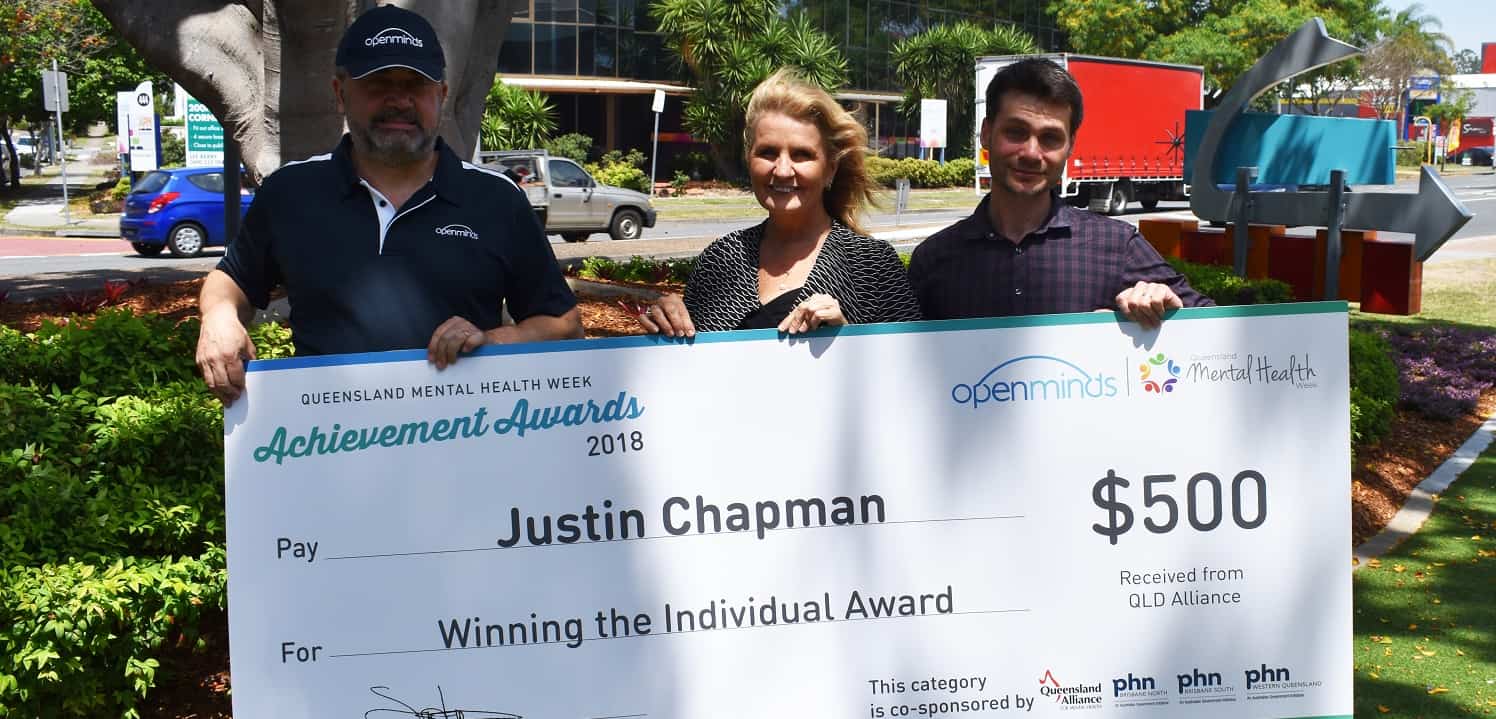Exercise for
optimal mental health
Open Minds spoke to Justin Chapman, winner of the 2018 Queensland Mental Health Week Achievement Awards Individual Award category, to find out his views on how exercise is beneficial for our mental health, and why improving our mental health is so important.


Introducing Justin
Justin Chapman, from Brisbane, was the proud winner of the Individual Award during the 2018 Queensland Mental Health Week Achievement Awards.
He began his mental health career working as a peer-support worker in 2011, where he developed and implemented peer-support and exercise programs for people with mental illness. This holistic focus on health and recovery inspired him to pursue his doctorate in measuring and positively influencing physical activity in adults with mental illness, which he completed in 2016.
He currently works as a Research Officer at QIMR Berghofer’s Mental Health and Complex Disorders research program, and a Consumer Consultant with Metro South Addictions and Mental Health Service where he researches person-centred interventions and systems-focused approaches to improving the health and wellbeing of people with mental illness.
Justin also works with PCYC Queensland, establishing community-based exercise and lifestyle programs for people recovering from mental illness across Queensland.
As well as the individual Award, Justin also accepted an Award on behalf of PCYC Queensland for the Not-For-Profit Large category, awarded for the impact of PCYC’s Healthy Bodies, Healthy Minds program.
Why is mental health so important to you?
We’ve all experienced poor mental health in one form or another, so it’s something that everyone can relate to on some level.
The many factors that contribute to our experience of ‘mental health’ are interconnected, and a positive influence in one area has a knock-on effect to other areas.
My work is mainly in research and implementation of exercise and nutrition interventions for people with mental health issues – physical activity and healthy eating can improve mental health, so I like to think that by helping people with these aspects of their lives, they’ll find greater peace in other aspects.
How is exercise beneficial to our mental health?
Exercise is beneficial for mental and physical health through both physiological and psychological pathways.
Exercise improves hormone response and reduces systemic inflammation and chronic stress, as well as providing distraction, time-out and the opportunity for social interaction and increased community engagement.
When people exercise for leisure, enjoyment and to achieve goals, it can become a personally meaningful pursuit and aspect of identity.
Why do you think we all need to look after our mental health?
Mental health is so integral to how we experience the world. It influences the thoughts we have, decisions we make, our interactions with others, and the lives we lead.
It can be difficult to have insight to when our mental health begins to suffer – stress can be ignored, and we can carry emotional baggage for so long it becomes the norm.
Looking after our own mental health helps us appreciate that we, and others, are deserving of the inherent kindness we all have to offer.
Have you seen any new mental health initiatives that you’ve been impressed by? If so what are they and why have they impressed you?
At a state level, I’ve been excited to see approval of the Health Minister Steve Miles’ initiative Health and Wellbeing Queensland (HWQ).
Although not specifically mental health, the vision is to intervene on the skyrocketing rates of obesity and chronic disease.
HWQ will support initiatives that help people lead healthier lives, leading to improved quality of life for individuals, and ultimately a more productive and vibrant community.
Locally at Metro South Addictions and Mental Health, I’ve been very impressed with the work of Peter Kohleis who’s leading projects to improve the integration of digital systems.
Database linking within public health services and external pathology databases reduces duplication of data entry for clinicians resulting in better workforce efficiency, and improves availability of information leading to better patient care.
What did winning a QLD Mental Health Week Award last year mean for you?
Personally, the award has been important for recognising that lifestyle interventions have an important place in the mental health sector, and that community organisations are ideally situated for forming collaborative care pathways to meet this need.
People have reported life-changing effects from participation in exercise and nutrition programs, so it’s good to see exercise physiology, dietetics and physiotherapy in strong focus of mental health care.
The award highlights an exciting period of mental health reform in which holistic mental health approaches are being implemented as innovative service models.
